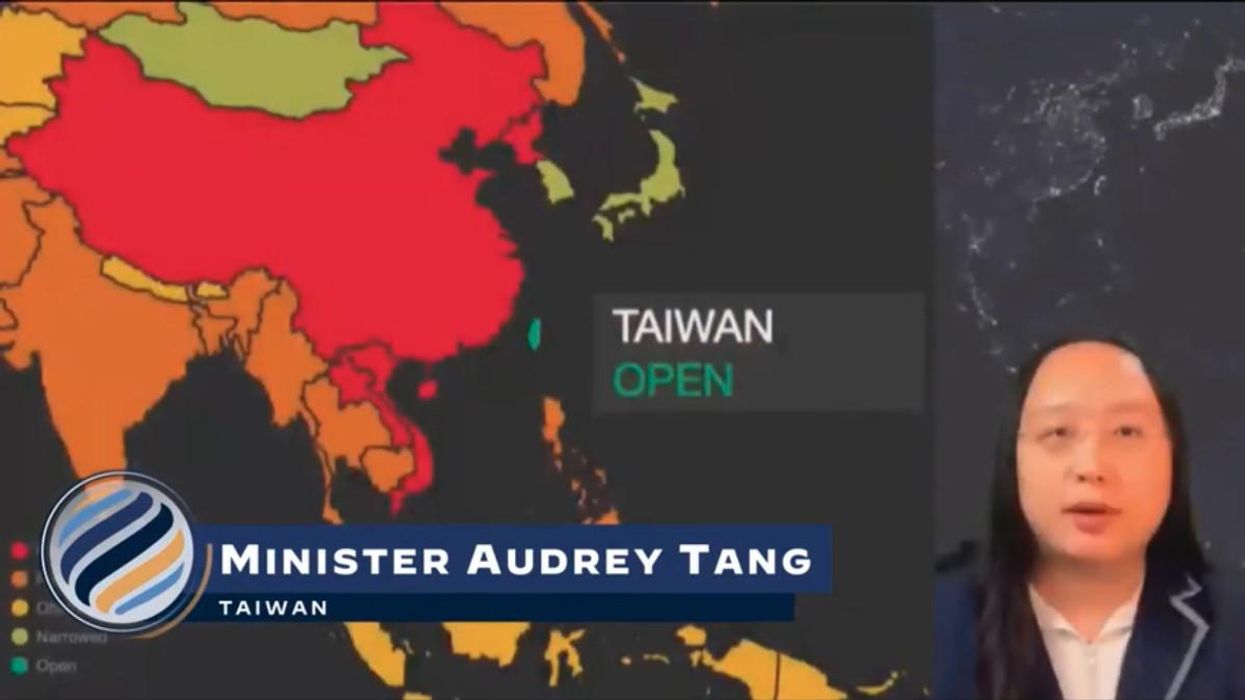
YouTube Screenshot | The Summit for Democracy

White House officials reportedly cut off the video feed of a Taiwanese minister during President Joe Biden's Summit for Democracy last Friday because a map in her slide presentation showed Taiwan in a different color than China, which claims sovereignty over the island.
According to Reuters, a slideshow presentation from Taiwanese Digital Minister Audrey Tang "caused consternation among U.S. officials after the map appeared in her video feed for about a minute."
The video feed showing Tang during a panel discussion was cut and replaced with audio only on the orders of the White House, Reuters reports:
The sources, who did not want to be identified due to the sensitivity of the matter, said the video feed showing Tang was cut during a panel discussion and replaced with audio only - at the behest of the White House.
The White House was concerned that differentiating Taiwan and China on a map in a U.S.-hosted conference - to which Taiwan had been invited in a show of support at a time when it is under intense pressure from Beijing - could be seen as being at odds with Washington's "one-China" policy, which avoids taking a position as to whether Taiwan is part of China, the sources said.
The Biden administration denies that the feed was cut intentionally. A State Department spokesperson told Reuters that "confusion" over screen-sharing during the video conference resulted in Tang's feed being dropped, calling it an "honest mistake."
"We valued Minister Tang's participation, which showcased Taiwan's world-class expertise on issues of transparent governance, human rights, and countering disinformation," the spokesperson said.
Tang's presentation highlighted how Taiwan has a very open record on civil rights compared to neighboring countries in the region, including communist China.
She had a slide displaying a color-coded map of the world, ranking countries by openness on civil rights. The map is a product of the South African nonprofit CIVICUS, which tracks civil rights around the world.
9 out of 10 people live in countries where civic rights are severely restricted.\n\nNew #PeoplePower2021 report launched today shows where civil society conditions are improving and getting worse. A closer look at top violations & trends : https://web.civicus.org/PPUA2021\u00a0pic.twitter.com/9j6DGTONUr— CIVICUS Monitor (@CIVICUS Monitor) 1638922383
Tang observed that Taiwan is the only Far East country with an "open" designation for civil rights, denoted by the color green. Other nations, including the U.S. and several of its allies in the region, are color-coded for "closed," "repressed," "obstructed," or "narrowed."
China, Laos, Vietnam, and North Korea are coded red for "closed."
During the panel discussion, when the moderator returned to Tang a few minutes after her initial presentation, the video feed was cut and replaced with audio and a screenshot captioned "Minister Audrey Tang Taiwan." Later, a disclaimer was added that said: "Any opinions expressed by individuals on this panel are those of the individual, and do not necessarily reflect the views of the United States government."
According to Reuters, the map "generated an instant email flurry among U.S. officials" as the White House National Security Council (NSC) "angrily" contacted the State Department, concerned that the map showed Taiwan as a distinct country from China.
"Washington complained to Taiwan's government, which in turn was angry that Tang's video had been cut," Reuters reports.
Sources that spoke to Reuters said the White House ordered the video booth operator to cut Tang's feed. They observed irony in the fact that a panel discussing "countering digital authoritarianism" as part of a larger discussion on strengthening democracy censored one of the panelists to avoid offending China, an authoritarian one-party dictatorship.
"They choked," said one official.
A NSC spokesman disputed Reuters' report.
"At no time did the White House direct that Minister Tang's video feed be cut," the spokesman said, echoing the State Department's claim that there was "confusion" over video-sharing.
Taiwan's foreign ministry blamed "technical problems" for the disruption.
"Taiwan and the United States have fully communicated on this technical issue, and the two sides have a solid mutual trust and a solid and friendly relationship," it said.